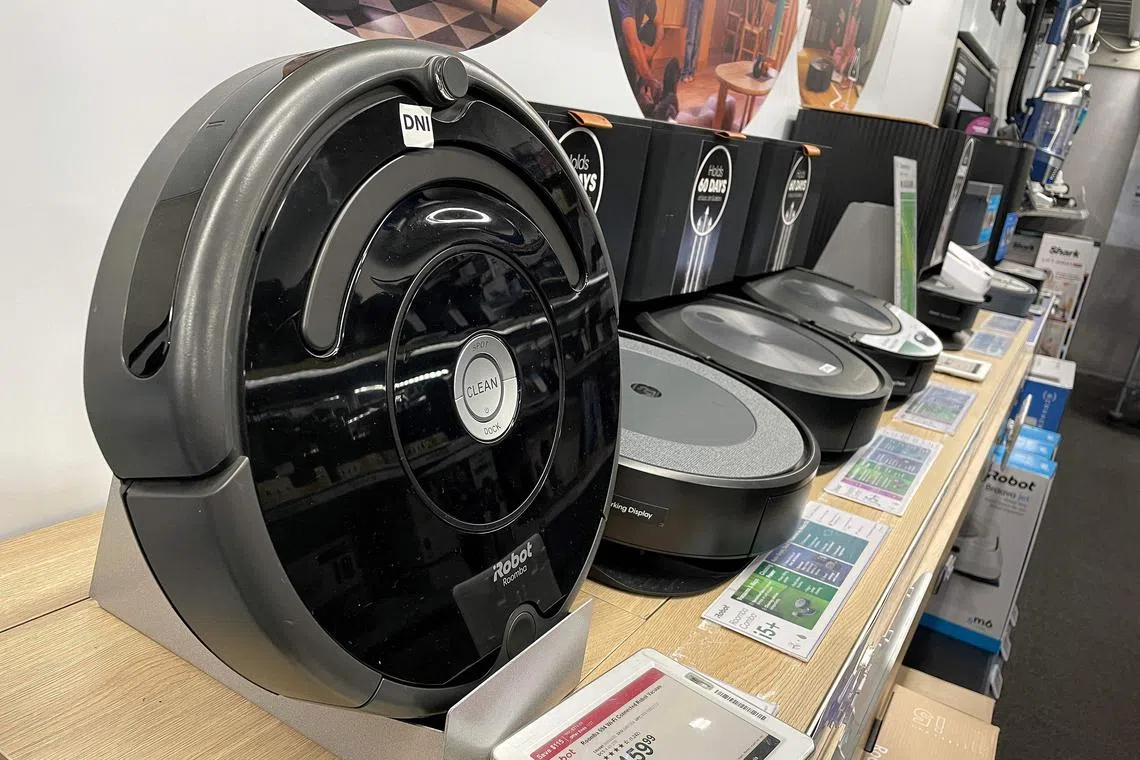Amazon scraps deal to buy Roomba maker amid regulatory scrutiny; iRobot cuts 31% of jobs
Sign up now: Get ST's newsletters delivered to your inbox

iRobot announced a significant restructuring plan to reduce costs and said it would cut about 31 per cent of its workforce.
PHOTO: AFP
Follow topic:
WASHINGTON – Amazon and robot vacuum maker iRobot said on Jan 29 that they would end their plans to merge in the face of opposition from European Union and United States antitrust regulators.
Critics opposed the deal, saying it would strengthen Amazon’s already powerful position in smart home devices.
The announcement is a rare admission of defeat by Amazon, which has in recent years acquired an eclectic mix of companies such as Whole Foods and MGM Studios.
It is a sign of how the world’s largest tech companies are being forced to adjust their business practices, products and policies as a result of stiffening regulatory scrutiny globally, particularly in the EU.
iRobot, known for its Roomba robot vacuum cleaners, announced a significant restructuring plan to reduce costs and said it would cut about 31 per cent of its workforce, or 350 jobs.
The company added that founder Colin Angle has stepped down as its chief executive.
Mr Angle said given the current challenges, he and the board “mutually decided that iRobot will be better served by a new leader with turnaround experience”.
Amazon said its proposed US$1.4 billion (S$1.9 billion) acquisition of iRobot had no path to regulatory approval in the EU.
EU antitrust chief Margrethe Vestager said on Jan 29 that its in-depth investigation preliminarily showed “the acquisition of iRobot would have enabled Amazon to foreclose iRobot’s rivals by restricting or degrading access to Amazon stores”.
Reuters reported earlier in January that the deal would be blocked by European Commission antitrust regulators and that its main concerns were that Amazon could thwart iRobot rivals on its online marketplace, especially in France, Germany, Italy and Spain.
Amazon could have delisted rival robot vacuum cleaners, reduced visibility of rivals or raised costs of iRobot’s rivals to advertise and sell their robot vacuum cleaners on Amazon’s marketplace, Ms Vestager added.
Separately, the Federal Trade Commission (FTC) was poised to reject Amazon’s deal before the companies announced they were abandoning it, a source told Reuters.
FTC staff met Amazon last week to inform them that they planned to recommend the commission vote to sue to block the acquisition, the source added, saying the commission was set to hold a final meeting on Jan 29 with Amazon before the commission could have voted to approve a legal challenge to the merger.
Amazon announced the deal in August 2022.
The world’s largest online retailer, which already owns Alexa and Ring, was pushing to expand its stable of smart home devices and its virtual healthcare.
“We’re disappointed that Amazon’s acquisition of iRobot could not proceed,” said Mr David Zapolsky, Amazon’s general counsel.
“We’re believers in the future of consumer robotics in the home and have always been fans of iRobot’s products,” he added in a statement.
iRobot said it expects to report full-year 2023 revenue of US$891 million, a 25 per cent reduction and a loss of between US$265 million and US$285 million. Under the terms of the merger agreement, Amazon will pay iRobot a US$94 million termination fee.
Amazon has a mixed record with competition regulators in recent years, completing a deal for healthcare provider One Medical and MGM’s movie library.
But it faces a long court battle in a Seattle federal court with the FTC over accusations that the company uses illegal strategies to boost profits at its online retail empire, including an algorithm that allegedly pushed up prices by more than US$1 billion.
iRobot shares fell 7.2 per cent in afternoon trading on Jan 29.
Since first reports that the deal might be blocked by EU regulators two weeks ago, iRobot shares have fallen by half. Amazon shares rose nearly 1 per cent. REUTERS, NYTIMES

